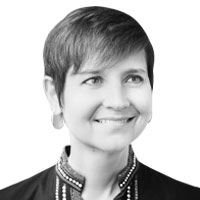In one of the most poignant moments of Newsweek and The Daily Beast’s Hero Summit on Thursday, Patti Walker described the day she saw her husband after shrapnel had shot through his brain in Iraq.

"The only way I recognized my husband was from the tattoos on his arms, because he was so incredibly swollen,” she said. The doctors told her to get busy and find a nursing home, as the prognosis was “a vegetative state at best.” Walker thought it was too soon for the doctors to determine her husband’s fate.
“I left the room,” she said, in a show of defiance.
Today, her husband, Kevin, sat in the audience at the summit, drawing a standing ovation. He has had a phenomenal recovery. “The vegetative state they thought he was gonna be in was not,” said Walker, who now works as an advocate for the U.S. Army Wounded Warrior Program, which provides services for severely injured soldiers.
Walker was one of four panelists who described the toll war takes on families, and the grassroots groups that have cropped up to help.
Panelist Kim Ruocco said her family suffered a devastating blow when her husband took his own life after serving in Iraq. “My husband lived a heroic life but died a not-so-heroic death,” she said. “My fear was that the way that he died would wipe out the way that he lived.”
Having lived through such tragedy, she now works with other families who have lost a loved one to suicide, serving as a director at the Tragedy Assistance Program for Survivors. “When someone dies by suicide, the family has a completely different kind of grief process,” she said. “My passion was to figure out how to help other families once I finally got through it.”
Now, she said, her 18-year-old son wants to join the military, “to finish what his dad started.”
Bill Norwood, another panelist, lost his son Byron in Iraq in 2004. His family formed an informal support network to help fellow military families heal.
"Byron was dedicated to a life of service,” he said. When he learned of his son’s death, Norwood said, “The Marine Corps. wrapped its arms around us, and we knew we needed to give it back.”
Panelist Lori Bell founded the National Association of Military Moms and Spouses. She told moderator Deborah Roberts, a correspondent for ABC News, about the challenges spouses face, moving every three to five years, as soon as “you hit your stride.” She set out to create a “sisterhood,” she said.
In closing, Patti Walker noted that there are things everyday citizens can do to help returning soldiers as well. If you’re a teacher, she said, volunteer as a mentor. If you’re a barber, offer a haircut. “It’s difficult to get on your feet.”






